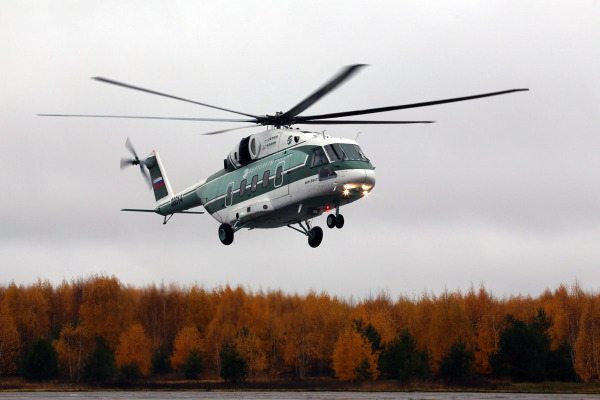The fourth prototype of the new multirole Mi-38 helicopter has carried out a series of ground runs and completed its first flight at Russian Helicopters’ (part of State Corporation Rostec) Kazan Helicopters’ test flight centre.
The helicopter was piloted by a team comprising commander and test pilot (first class), honored test pilot of Russia, Vladimir Kutanin, the second pilot was second class test pilot Maxim Shezhin, and chief flight test engineer, second class, Sergei Panin. The helicopter was then sent to the test flight center at Mil Moscow Helicopter Plant for preparations ahead of its certification testing.
“The Mi-38 development program is making good progress,” Russian Helicopters deputy CEO, Kazan Helicopters CEO Vadim Ligai said. “Today, for the first time, the fourth prototype of this helicopter – that will soon start certification testing – took to the skies.” “Assembly production has already been launched on the fuselage of the first series-produced units. The Mi-38 has proven it boasts unique capabilities. I am confident that the helicopter will see great demand in Russia, the CIS countries, and on our traditional markets – countries across Africa, South East Asia, and Latin America.”
“The Mi-38 fourth prototype’s first flight was a success,” aircraft commander and test pilot (first class) Vladimir Kutanin said. “The helicopter handles well, all systems worked excellently during the test flight. The developers and producers of the Mi-38 can be proud. As pilots, we really liked the helicopter, it boasts excellent flight capabilities that should ensure it has very bright prospects.”
The Mi-38 fourth prototype differs from that of the third prototype in its shock-resistant fuel system and larger windows. As with the third prototype, the fourth prototype of the Mi-38 is equipped with twin TV7-117V turboshaft engines manufactured by Klimov. The engines’ power shafts are in a forward position and are located behind the main gearbox, which significantly reduces the level of noise in the cabin.
Aviation experts are confident that the Mi-38’s enhanced payload and passenger transportation capacity, combined with the high levels of speed and comfort achieved, will ensure it becomes one of the most popular models in regional aviation, chiefly for passenger and cargo transportation. Its low noise levels, reduced flight preparation time, roomy passenger cabin, meeting new flight safety standards all open up broad operational opportunities for the Mi-38, including in VIP transport. Mi-38 class helicopters boast greater operational profitability than small aircraft thanks to a variety of features, including the fact that they boast highly efficient engines do not need any airfield infrastructure.
Kazan Helicopters produces Mi-8/17 series helicopters that are operated in over 100 countries worldwide. A wide range of configurations are produced: transport, passenger, search and rescue, landing and transport, among many others. Preparations are underway to launch production of the Mi-38 passenger transport helicopter. Since 1997, Kazan Helicopters has been certified to develop helicopter technology: today the light twin-engine Ansat helicopter is in series production.
Mil Moscow Helicopter Plant is a subsidiary of Russian Helicopters. Its key areas of activity are experimental research and design, and the design, construction and testing of prototype helicopters. Since its founding, the Plant has created 12 basic models of helicopter, including the Mi-8/17, Mi-35M, Mi-26, Mi-28, Mi-38 and numerous modifications. Mil helicopters are in operation in 110 countries worldwide and form the backbone of helicopter aviation in Russia, the CIS, as well as in countries in Asia, Latin America, Africa and the Middle East.
Russian Helicopters, JSC is a subsidiary of UIC Oboronprom, which in turn is a part of State Corporation Rostec. It is one of the global leaders in helicopter production and the only helicopter design and production powerhouse in Russia. Russian Helicopters is headquartered in Moscow. Russian Helicopters was established in 2007. In 2013 its IFRS revenues increased 10% to RUB 138.3 billion. Deliveries reached 275 helicopters.










